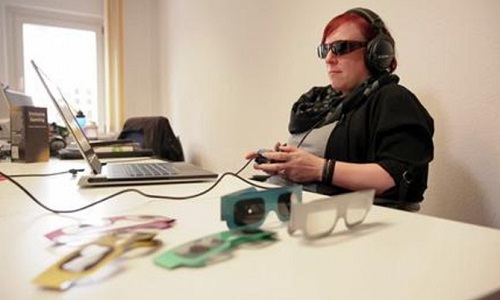Video games have evolved significantly from their early days as mere gadgets for entertainment. They encompass expansive worlds, creative spaces, educational environments, community hubs, and marketplaces. Today, video games are woven into the fabric of our digital landscape, regardless of the devices we use—be it smartphones or virtual reality headsets.
However, despite this evolution, a large portion of society is still being excluded. As noted by Arianna Ortelli, co-founder and CEO of Novis Games, over 250 million individuals who are blind or visually impaired are mainly left out of this experience. This realization prompted her to embark on a journey to initiate change.
In 2019, while studying economics in Turin, Italy, Arianna engaged in a project to develop a video game concept utilizing sound and vibration, enabling players to connect and enjoy outdoor gameplay. This experience sparked a moment of clarity for her.
“We exchanged a look and thought: ‘If I can play this using just sounds and vibrations, then a blind person can too,” she recollects. This led her to ponder: How can all games be made more accessible for those with visual impairments?
Shortly after this insight, Arianna participated in a meeting with her local blind association, where she met Marco Andriano. Excited by the prospect of making games accessible to more individuals like him, Marco eventually became her co-founder and Chief Marketing Officer.
Through Marco, Arianna gained valuable insight into the various challenges that visually impaired individuals encounter while engaging with video games or interactive entertainment.
“We started testing various games together back then. For instance, we examined football games across multiple consoles. In simpler games where there’s enough time for contemplation and possibly assistance from others, it’s doable,” she explains. However, she notes that many games are filled with intricate visual detail and often involve competing against other players, leaving little room for thoughtful decision-making.
“This is true even for those with low vision. Just think about how it must feel without any vision. The initial entry into the game, such as navigating the first menu, can be particularly difficult. It’s hard to discern where to go to begin the game.
“We exchanged a look and thought: ‘If I can play this using just sounds and vibrations, then a blind person can too.”
— Arianna Ortelli
With a better grasp of the subtle challenges involved, Novis Games started brainstorming solutions. Initially, they focused on creating their own original games, but soon recognized that the industry needed options applicable to game developers as a whole. As Arianna points out, integrating these features can be quite challenging and costly for developers to manage independently.
They began by exploring ways to improve the user interfaces and menus of games to enhance accessibility. Utilizing existing technology, they developed methods to provide automated audio descriptions for menu items and relevant on-screen visuals. Following this, they concentrated on in-game object recognition and mapping.
“We began developing 3D audio that can help users locate elements in the game as well as understand their significance. For example, as you navigate through a fantastical environment, you can detect if something is in your path and whether it poses a threat, is beneficial, or is an item to collect.
After establishing these features, Novis Games began the process of bundling them into a tool that developers could implement across different games. In the past 18 months, they have created demos for various genres, including platformers, first-person shooters, and point-and-click adventures.
Although Novis Games has primarily worked manually to incorporate its accessibility features into simpler games, its objective is to enhance the experience for a wider range of complex—and widely popular—genres for individuals with visual disabilities.
To realize this aim, Novis Games is collaborating with Microsoft’s generative AI technology. By training the AI with their work on simpler games, Arianna believes the team will be able to scale their tools for use in more intricate situations.
“Action games, where there are numerous elements and swift decision-making required, present a challenge. The greatest difficulty lies in automating this process. We believe we can train the AI to be adequately prepared.”
Arianna points out that while it may not be feasible to make fast-action games entirely accessible for individuals with visual impairments, the initiative to create easily adjustable, AI-based tools to enhance accessibility will unlock new possibilities. She envisions different types of games where players with sight challenges can more easily assume various character roles.
“If I’m unable to provide all the necessary information to certain players, perhaps they can still contribute in alternative ways. They might utilize sounds or their voice, fostering collaboration among players,” she notes.
“What used to require us thousands of hours in development can now be accomplished in just a few minutes.”
— Arianna Ortelli
Novis Games has enhanced its AI capabilities through its participation in Microsoft’s Entrepreneurship for Positive Impact programme. This initiative supports early-stage start-ups focused on delivering social benefits, offering mentoring, technical expertise, increased visibility, and access to Microsoft technology.
Arianna shares that her journey to joining the programme was both fascinating and transformative. Aspiring social entrepreneurs can apply through the programme’s website, and in 2021, the Novis Games team was invited to present a three-minute pitch in person to Microsoft Executive Vice President Jean-Philippe Courtois at an event in Milan. A few months later, they became part of the programme.
“It was quite interesting!” she remarks. “It’s not merely a mentoring programme; it’s a tailored experience for each participating start-up. We were assigned a dedicated mentor who provided us with valuable contacts, technologies, and connections to others who wished to support us in scaling our idea from our local market to broader ones.
Novis Games was matched with the “incredible” Juliana Tioanda, Chief of Staff for Microsoft’s Xbox Engineering division, enabling them to gain access to outstanding industry-specific guidance.
“We gradually understood, month after month, the key areas we needed to concentrate on. We consistently achieved our goals.”
In September 2023, Arianna, alongside Juliana and Wyatt Jackson, Principal Software Engineering Manager of Microsoft’s Xbox Cloud Gaming service, led a team in the company’s annual Global Hackathon. This event brought together a diverse group of Microsoft experts from several countries to delve into how generative AI could help eliminate barriers in implementing accessibility features for game developers. The team finished in second place overall.
“I, of course, included my entire Novis Games team. We had the chance to analyze our work on a point-and-click game and recreate it in just one week using generative AI, allowing us to create a toolkit applicable to various game types,” explains Arianna.
Novis Games has developed its technology utilizing Microsoft Azure services and SeeingAI, a Microsoft-designed iOS application that employs an iPhone’s camera to recognize people and objects, audibly describing them for the visually impaired.
“To illustrate,” she explains regarding both the programme and the Global Hackathon’s impact on their AI usage, “what previously took us thousands of hours to develop can now be achieved in only a few minutes.
“We can generate similar fundamental features – such as audio descriptions or in-game element recognition – directly from the game files and during runtime, which is quite remarkable.”
With the rapid progress achieved using generative AI, Novis Games is now focused on providing templates for developers to fundamentally change how they enhance accessibility in their games. What previously occurred (and was costly) at the end of the development process can now take place during the software build.
Ultimately, Arianna believes that the work being done by Novis Games – significantly supported by Microsoft’s experts – could lead to advancements well beyond the realm of gaming.
More accessible games mean greater accessibility for all, not just for those with visual challenges. The innovative AI-driven features themselves could give rise to entirely new gameplay dynamics. Furthermore, video games are just one category of software that could benefit; similar applications can easily be envisioned in GPS navigation, other location-based services, vehicle operation, or interactions with smart devices, among others.
Currently, Novis Games is collaborating with Microsoft to pinpoint 10 games for testing the technology, through which it could eventually be made available to users via Xbox channels.
“For the first time, it will be possible to play something like this – everyone will be able to play on their PC or Xbox. It’s truly extraordinary!”
Blind gamers say accessibility is a ‘must-have’
Kellie Dingwall is among the increasing number of visually impaired individuals who are engaging in online gaming.
“One of my closest friends and I strengthened our friendship through playing games together online, making it a weekly ritual,” she shared with BBC Scotland.
“Now, we’ve formed a small community of blind gamers.”
Gaming companies are beginning to consider factors such as sight loss and motor skill challenges as they expand their games to reach a wider audience.
Gamers with disabilities have highlighted a cultural shift in game development, with accessibility features now integrated “from the ground up”.
Kellie mentions that changes can be straightforward, like enlarging on-screen text for those with partial sight loss or enhancing color contrast options.
Other games offer more customized features.
“Recently, I discovered a game that allows me to use text-to-speech, which reads out letters or options during conversations, for instance,” Kellie remarked.
Even with advancements in accessibility, Kellie admits she can feel cautious about trying new games.
“I usually check reviews before purchasing,” she noted.
“I typically avoid pre-ordering games because I’m uncertain about the accessibility features.”
James Kyle, who is associated with RNIB Scotland, has been managing a gaming group for visually impaired individuals.
“There’s no reason why individuals without sight should be excluded,” he stated.
One gaming style he emphasizes is an audio game, where players don headphones and navigate through a 3D audio environment, guided by sound effects and audio descriptions.
James mentioned that his blind gaming group connects people from Scotland, Northern Ireland, England, and various other locations around the globe.
Video game development is projected to contribute £350 million a year to the Scottish economy, with developers increasingly aware of their target audiences.
Dundee has a longstanding connection to game development, and Abertay University in the city emphasizes the importance of accessibility in its curriculum.
Dr. Lynsay Shepherd from the university remarked, “Disabled gamers have been marginalized for far too long.
“Action is necessary to ensure that everyone can enjoy the pleasures of gaming.”
She stated that accessibility is emphasized “from day one” in their educational approach.
“We ensure that it is discussed throughout the curriculum, along with the associated challenges,” she explained.
Dr. Shepherd noted that there has been “immense” growth in accessibility in recent years, and she anticipates that eye-tracking technology for individuals with physical limitations may be the next area of focus.
“Laptops now have very high-quality webcams,” she added.
“These can be utilized to track eye movements to control the computer, which can subsequently be integrated into games.
“This advancement is set to make gaming much more accessible to a broader audience in the near future.”
Addressing the gaming market for those with intricate physical needs is also a focus in Dundee.
Konglomerate Games developed a game designed to assist young individuals with Cystic Fibrosis.
It utilizes the player’s breath to manipulate mini-games, such as shooting darts at balloons.
The aim is for them to enjoy themselves while also carrying out necessary breathing exercises.
“We strive to create games for individuals with various disabilities or conditions so they can enhance their lives,” stated chief executive Jamie Bankhead.
“The market is substantial. If children can engage in games that provide some benefit, that’s wonderful.”
Mr. Bankhead pointed out that developers should be mindful of people’s motor skills and understand that the physical act of holding a controller may be discouraging, or that its vibrations could be uncomfortable.
He emphasized that accessibility features are increasingly seen as “essential rather than optional.”
“Players are beginning to actively reject games that don’t meet even the basic accessibility standards, and this trend is expected to grow across the gaming industry,” he asserted.
Top 5 great mobile games for blind people
Accessible gaming was previously considered an unattainable concept. It was widely believed that games couldn’t be made accessible. However, the situation has changed significantly today, with numerous games available across various platforms.
Let’s explore five mobile games that are particularly commendable for their accessibility.
Dice World
Dice World offers a suite of six dice games all within a single app. You can enjoy games like Arkle!, Pig, Yatzy, Threes, 1,4,24, and Balut. If you’re unfamiliar with any of these games, you can utilize the tutorials available in the app, which are designed to be universally accessible.
The game emphasizes social interaction; while you can opt to play against AI opponents, the true charm of Dice World lies in competing against other players.
You can engage in one-on-one matches, participate in tournaments, ascend the leaderboard, and take advantage of various social features like in-game chat. It’s all designed with excellent accessibility in mind, including compatible VoiceOver options with well-crafted custom interfaces and notifications for major events.
Though I haven’t played in some time, I fondly recall connecting with fellow Camp Abilities campers on Dice World back in the day. It’s an outstanding game that is truly worth downloading.
Frequency Missing
Frequency Missing is a brief game that you are likely to play only once, but it offers an exceptionally enjoyable experience.
In the game, Patricia starts working at a new radio station, but her friend and co-worker Richard has gone missing. You can interact with characters by moving your finger on the screen and lifting it to reactivate. This game is intended to be played with headphones, utilizing directional audio to navigate.
With complete voice acting, the game is well-constructed. If you’re in search of a straightforward, short narrative experience, Frequency Missing is an excellent choice.
Audio Game Hub
I have a strong appreciation for the Audio Game Hub. It’s an application featuring a variety of games designed to be played through audio.
The games are straightforward yet entertaining. Each game boasts fantastic voice acting and sound effects, and I found the navigation style to be quite accessible.
You can find a great selection of games, ranging from a narrative-driven game where you disarm bombs to a simple casino experience with blackjack and slots. The app also includes multiplayer games, so if you ever want to have a virtual samurai duel with a friend, you can do that.
Originally, the Blind Foundation New Zealand partially funded the game, but they are no longer referenced, and it seems development has largely paused.
All the games can be tried for free, but to play without ads, a purchase or subscription is required. While this can be frustrating, it’s understandable given the cost of professional voice acting.
It’s definitely worth exploring to see if there’s something you’d enjoy, as the app is very well designed.
Pitch Black, A Dusk Light Story
Pitch Black is an audio-based story app that guides you through its environment using sound. You navigate the world with an on-screen joystick.
The sound design is impressive, but I found the joystick a bit challenging to handle. I think I recognize some voices from an old PC game called Park Boss, but I might just be imagining that.
If you’re experienced with joystick-driven games, this app is worth a try. The storyline looks intriguing, and the sound design is truly outstanding.
Without any visuals, it’s an ideal game for those with low or no vision, but do consider the navigation method, as it’s not the usual style for VoiceOver users.
Timecrest
Timecrest has long been my favorite accessible game on iOS. It’s an interactive text-based story game where you accompany Ash, who resides in the distant world of Alincia. As the narrative unfolds, meteors are on a collision course with Alincia, and you discover your ability to manipulate time.
The game’s level of accessibility is remarkable, creating an incredibly enjoyable experience. Features include an optional pronunciation mode, the ability to differentiate sounds between VoiceOver reading dialogue or descriptions, and music that adapts dynamically based on the VoiceOver cursor’s position. Each page provides descriptive guidance, and that’s just the tip of the iceberg.
It’s hard to fully express how accessible this game is for VoiceOver users; they have truly elevated accessibility to an art form. This game allows VoiceOver to perform functions I never realized it could, making it feel almost magical.
With content that spans ten novels and over 600,000 words, there’s a wealth of exploration available in Alincia, ensuring that even as a long-time player, I still have new places to discover and characters to meet.
You can choose to spend money on the game, but it’s not a requirement if you prefer not to.
If you decide to try any game from this list, I highly recommend giving Timecrest a chance. It’s beautifully written, features a fantastic soundtrack, and is available for free.
Conclusion
It’s wonderful to see such games available, yet I wish more existed. I admire the ambitious approach of games like Timecrest and the Audio Game Hub, as individuals with visual impairments deserve more than just simple games.
Conceptualizing a video game without any actual visuals might appear to be an unconventional notion.
Nevertheless, this idea is being embraced by an increasing number of game developers aiming to enhance accessibility for blind and visually impaired individuals.
“Audio-only” games utilize a production method called binaural recording to create an immersive, purely auditory environment.
This technique involves placing tiny condenser microphones on a dummy to replicate how our ears naturally perceive sound. Each game scene is captured using this approach, resulting in a more realistic, three-dimensional auditory experience.
Since no graphics are present, players depend on their hearing to navigate through the game levels.
The newest release in this category was just introduced by a group of innovative developers in France. They successfully raised over 40,000 euros (£31,000) via a crowdfunding campaign to transform their demo into a working prototype.
“This is an incredibly thrilling and fascinating project,” Nordine Ghachi expressed to the BBC.
The creative technologist is part of a trio at Dowino, an external studio in Lyon, who developed the game “Blind Legend” for handheld devices.
“Our primary goal was to place blind and differently-abled gamers on the same level of quality as sighted gamers. That was our foremost objective and challenge,” he noted.
“Pierre-Alain Gagne, the CEO of Dowino, conceived the crowdfunding idea and oversaw it for months. Jerome Cattenot, our art director, crafted the entire game and made its world visually captivating.”
‘Utilize your creativity’
Blind Legend narrates the tale of a knight who, having lost his sight, embarks on a journey through a forest to rescue his wife from her aggressive captors.
The intuitive gameplay ensures a fully immersive experience. Players control the main character’s movements via a touch screen, using simple swipes to move their feet or sword on their mobile device. The screen remains dark throughout the gameplay.
“Wearing headphones is essential to fully appreciate the experience. You can perceive the sounds surrounding you,” Nordine explained.
“The sounds of the forest, birds soaring overhead, and a flowing river. These auditory cues assist the player in orienting themselves within that environment.
“The protagonist is guided by his daughter. You interact with her and follow her lead, employing your imagination to create your own effects.”
The game has been evaluated by several players with little or no vision and has received positive feedback from organizations such as the Valentin Haüy Association.
Not a first
This is not the initial instance where binaural technology has been employed in this way.
In 2010, the British game studio Somethin’ Else released Papa Sangre, another audio-centric thriller lacking any visuals. It gained significant popularity, especially among blind gamers, leading the company to produce several sequels.
Robin Spinks from the Royal National Institute of Blind People stated that the creation of such games engages a “vast market.” In the UK alone, there are two million blind or partially sighted individuals, and globally, the figure stands at 285 million.
“This style of gaming experience eliminates the barriers that blind and partially sighted individuals face daily,” he stated.
“It’s wonderfully inclusive. Most blind individuals find themselves unable to access the majority of gaming content. This sort of game sets a standard for other developers to aspire to.
“We have invested considerable effort in encouraging app developers to create accessible applications. It’s actually quite straightforward.
“One significant reason for the lack of accessible content is the absence of awareness. Developers seldom encounter blind and partially sighted users of their applications and games.”
‘A lonely experience’
The issue of inclusivity is something Nathan Edge is quite familiar with.
The 20-year-old gamer from Mansfield has been visually impaired since childhood, but he recently lost his sight completely.
He shared with the BBC: “It can feel quite isolating at times. You want to engage in activities that others are participating in, like gaming. It provides topics for conversation with friends.
“I can no longer play any of the text-based games I previously enjoyed. I’ve been quite frustrated trying to discover games that I can utilize.”
Nathan was so dissatisfied that he reached out to a well-known gaming company to voice his concerns about the limited gaming choices available to him. He expressed joy that smaller, independent companies were addressing these gaps.
“I found Papa Sangre II over the weekend and I can’t stop playing it.
“I typically don’t share things like that on Facebook or Twitter, but I’ve been telling everyone about it.
“It’s great news to see more developers creating similar projects. The more developers who take this path, the better. It will be a significant relief.”
Nordine mentioned that people like Nathan were a priority when developing Blind Legend.
“Most studios create the game first and then work on making it accessible,” he remarked.
“However, prioritizing functionality for the blind was our very first focus. We aim to design games that can influence people’s perceptions and attitudes towards disabilities.



